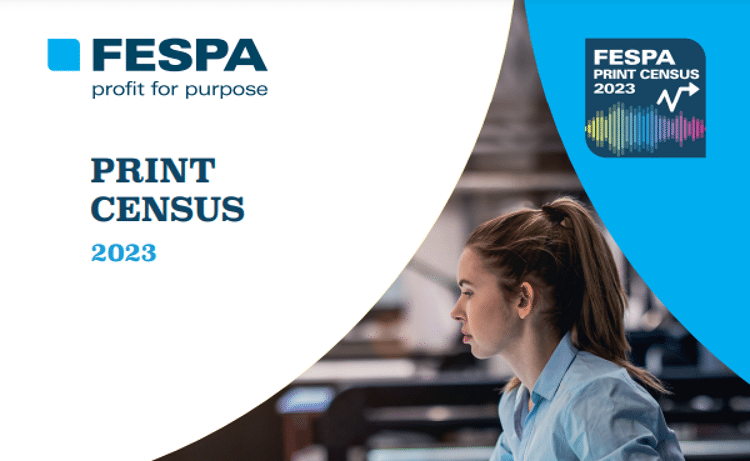FESPA Print Census: rising sustainability demands

Laurel Brunner discusses the importance of Sustainability in the FESPA Print Census. Respondents were all in agreement that there is a rise in sustainability demands. The FESPA Print Census provides a detail account of the latest industry trends for FESPA members.
Sustainability is at the top of the table, according to FESPA’s recently published findings from the latest Print Census. Respondents confirmed that rising sustainability demands are concerning them, along with keeping up with new business models and investment.
The survey of 1,778 printing companies from more than 120 countries was done in partnership with InfoTrends and focused on long-term trends identified in the 2018 Print Census. Five years ago printers were worried about the industry’s prospects including revenue and investment planning, customer expectations and rising environmental pressures. All of those concerns are still prevalent. However since the 2018 Census, respondents have seen an increase in average revenue of 7%: in 2018, average annual revenue was €4.4m, whereas in 2023 that figure was €4.7m. And today that 72% of print buyers want their service providers to be environmentally sustainable and to offer environmentally friendly products should be causing considerable excitement. That excitement might be good and/or bad, depending on where a business owner is on their sustainability journey.
For entrepreneurs coming into the graphics industry it should scream opportunity and provide powerful indicators as to the kind of kit they should be investing in. If 36% of respondents want both sustainable products and sustainable manufacturing, it’s a given that any business that meets those requirements will be able to tap into a ready and willing target market. Companies already investing in developing their sustainability credentials will also appreciate the vote of confidence that they’re on the right track. In all cases the business risk is substantially lower because the service provider already knows that their pitch will be well received. Perceived cost premiums associated with more sustainable products are not the barrier they once were to sustainable production. 70% of Print Census respondents said they can address sustainability expectations without price increases. A further 22% have already raised prices and have seen no impact on sales.
These numbers will make for gloomy reading for organisations who are not keen to invest in new energy efficient kit. Business owners reluctant to gen up on new substrates and colorants that are recyclable will also be feeling the pressure. And pressure it is to accept that the only way forward for this industry’s future success, is to take steps towards greater sustainability. Companies not planning to invest in the environmental sustainability of their business should be thinking again. The full Print Census report is available only to FESPA members, so if you are not yet a member, get signed up soonest. You can do so here.
Source Information: This article was produced by the Verdigris Project, an industry initiative intended to raise awareness of print’s positive environmental impact. This weekly commentary helps printing companies keep up to date with environmental standards, and how environmentally friendly business management can help improve their bottom lines. Verdigris is supported by the following companies: Agfa Graphics, EFI, Fespa, Fujifilm, HP, Kodak, Miraclon, RicohSplash PR, Unity Publishing and Xeikon.
Discover the latest innovations in sustainable print at FESPA Global Print Expo 2024, Europe’s leading print and signage exhibition. Taking place from 19th – 22nd March 2024 at RAI Amsterdam, Netherlands. Register here to visit and use promo code FESJ411 for a 30 euros discount.
Recent news

Sustainability in Production Print: Advancing Practices in Wide Format, Textiles, and Software
As sustainability continues to take centerstage across industries, the production print sector is making massive strides in integrating eco-conscious practices. From wide format to textile applications, with the growing reliance on advanced production software, the space is evolving to meet environmental goals as well as consumer demand for sustainable products.

Why must the print industry recognise software and material innovation
Laurel Brunner argues that the printing industry must recognise the value of both software and material innovation, and be willing to pay for it. Software, though intangible, drives efficiency and reduces carbon footprints. While materials science currently dominates, R&D costs are inherent in all advancements. Paying a premium ensures continued progress, benefiting the industry's evolution and sustainability.

Green Printing: how Sustainability drives business success
Nessan Cleary shares sustainable printing benefits businesses and the environment. Auditing suppliers and using eco-friendly materials are crucial. Optimising production with energy-efficient equipment and minimising waste reduces costs. Proper waste disposal and premises efficiency further lower the carbon footprint. Staff training and customer recycling solutions complete the sustainable approach.

Sustainability and keeping the faith
Laurel Brunner discusses how the printing industry has drastically reduced its environmental impact through technological advances, despite lingering perceptions of paper waste. While consumer habits pose a challenge, the industry continues to pursue greener practices.